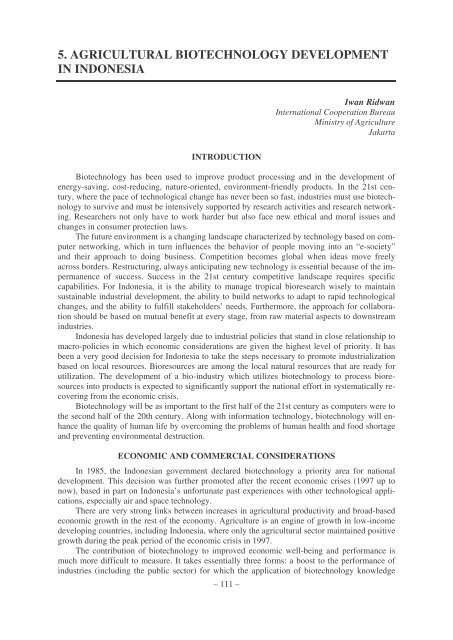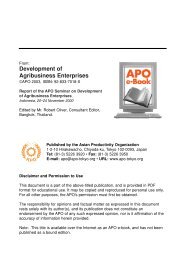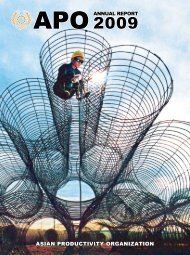Business Potential for Agricultural Biotechnology - Asian Productivity ...
Business Potential for Agricultural Biotechnology - Asian Productivity ...
Business Potential for Agricultural Biotechnology - Asian Productivity ...
You also want an ePaper? Increase the reach of your titles
YUMPU automatically turns print PDFs into web optimized ePapers that Google loves.
5. AGRICULTURAL BIOTECHNOLOGY DEVELOPMENT<br />
IN INDONESIA<br />
INTRODUCTION<br />
– 111 –<br />
Iwan Ridwan<br />
International Cooperation Bureau<br />
Ministry of Agriculture<br />
Jakarta<br />
<strong>Biotechnology</strong> has been used to improve product processing and in the development of<br />
energy-saving, cost-reducing, nature-oriented, environment-friendly products. In the 21st century,<br />
where the pace of technological change has never been so fast, industries must use biotechnology<br />
to survive and must be intensively supported by research activities and research networking.<br />
Researchers not only have to work harder but also face new ethical and moral issues and<br />
changes in consumer protection laws.<br />
The future environment is a changing landscape characterized by technology based on computer<br />
networking, which in turn influences the behavior of people moving into an “e-society”<br />
and their approach to doing business. Competition becomes global when ideas move freely<br />
across borders. Restructuring, always anticipating new technology is essential because of the impermanence<br />
of success. Success in the 21st century competitive landscape requires specific<br />
capabilities. For Indonesia, it is the ability to manage tropical bioresearch wisely to maintain<br />
sustainable industrial development, the ability to build networks to adapt to rapid technological<br />
changes, and the ability to fulfill stakeholders’ needs. Furthermore, the approach <strong>for</strong> collaboration<br />
should be based on mutual benefit at every stage, from raw material aspects to downstream<br />
industries.<br />
Indonesia has developed largely due to industrial policies that stand in close relationship to<br />
macro-policies in which economic considerations are given the highest level of priority. It has<br />
been a very good decision <strong>for</strong> Indonesia to take the steps necessary to promote industrialization<br />
based on local resources. Bioresources are among the local natural resources that are ready <strong>for</strong><br />
utilization. The development of a bio-industry which utilizes biotechnology to process bioresources<br />
into products is expected to significantly support the national ef<strong>for</strong>t in systematically recovering<br />
from the economic crisis.<br />
<strong>Biotechnology</strong> will be as important to the first half of the 21st century as computers were to<br />
the second half of the 20th century. Along with in<strong>for</strong>mation technology, biotechnology will enhance<br />
the quality of human life by overcoming the problems of human health and food shortage<br />
and preventing environmental destruction.<br />
ECONOMIC AND COMMERCIAL CONSIDERATIONS<br />
In 1985, the Indonesian government declared biotechnology a priority area <strong>for</strong> national<br />
development. This decision was further promoted after the recent economic crises (1997 up to<br />
now), based in part on Indonesia’s un<strong>for</strong>tunate past experiences with other technological applications,<br />
especially air and space technology.<br />
There are very strong links between increases in agricultural productivity and broad-based<br />
economic growth in the rest of the economy. Agriculture is an engine of growth in low-income<br />
developing countries, including Indonesia, where only the agricultural sector maintained positive<br />
growth during the peak period of the economic crisis in 1997.<br />
The contribution of biotechnology to improved economic well-being and per<strong>for</strong>mance is<br />
much more difficult to measure. It takes essentially three <strong>for</strong>ms: a boost to the per<strong>for</strong>mance of<br />
industries (including the public sector) <strong>for</strong> which the application of biotechnology knowledge
















